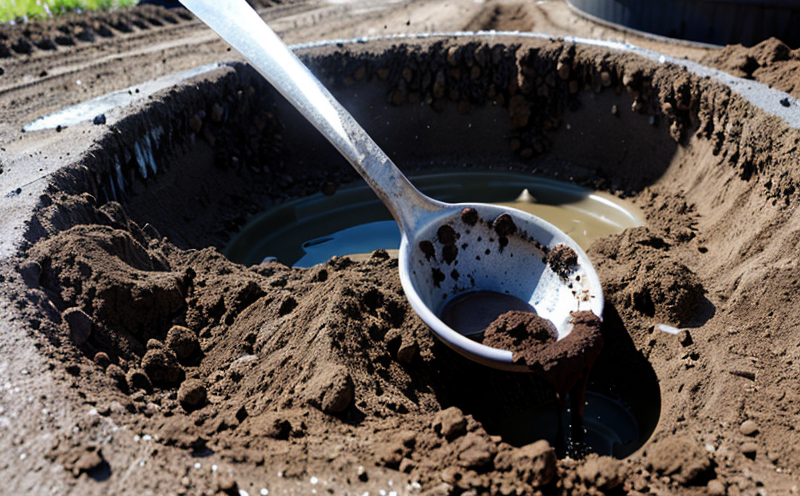APHA 2540H Volatile Solids in Biosolids Test
The APHA 2540H test is a widely recognized method for determining the volatile solids content of biosolids, which is essential for wastewater treatment plant (WWTP) operations and environmental compliance. This test helps facilities understand the organic matter present in their sludge or biosolids, providing critical data for proper management and disposal.
The determination of volatile solids is particularly important because it affects various aspects of WWTP operations, including digestion efficiency, bulking control, and nutrient content. Accurate measurement ensures that operators can optimize processes, minimize operational costs, and adhere to environmental regulations. This test is also crucial for assessing the quality of biosolids before they are used in agriculture or other applications.
The APHA 2540H method involves drying a known weight sample at a specified temperature (103 ± 2°C) until constant mass, after which time the volatile solids content is calculated. The process requires precision and attention to detail, as even minor deviations can lead to inaccurate results.
Understanding the volatile solids content of biosolids is vital for several reasons:
- Better Digestion Efficiency: Higher volatile solids indicate more organic matter, which can improve digestion rates. However, excessive volatile solids may also lead to bulking issues.
- Nutrient Management: Volatile solids content helps in determining the nutrient content of biosolids, which is important for agricultural use.
- Bulking Control: Monitoring volatile solids can help identify potential problems with anaerobic digestion processes that may lead to bulking or foaming.
The test also plays a key role in compliance with regulatory standards such as the United States Environmental Protection Agency's (EPA) guidelines and international standards like ISO 19654. Compliance with these regulations is crucial for maintaining environmental stewardship and ensuring that wastewater treatment facilities meet legal requirements.
Why It Matters
The APHA 2540H test is essential in the water & wastewater sector because it provides critical data on the composition of biosolids, which are a byproduct of wastewater treatment processes. By accurately measuring volatile solids, operators can make informed decisions about how to manage and dispose of these materials.
Accurate measurement of volatile solids helps in optimizing digestion processes, ensuring that WWTPs operate efficiently while minimizing environmental impact. It also aids in the decision-making process for biosolids utilization, whether they are used as an agricultural amendment or disposed of through other means. Proper management of biosolids is vital not only for operational efficiency but also for environmental protection.
Understanding the volatile solids content is particularly important when considering the use of biosolids in agriculture. The nutrient content and organic matter present can influence soil health and crop productivity, making accurate measurement a key factor in agricultural applications.
Scope and Methodology
| Parameter | Description |
|---|---|
| Biosolids Sample Collection | A representative sample of biosolids should be collected and homogenized to ensure accurate testing. |
| Drying Conditions | Sample is dried at 103 ± 2°C until constant mass, ensuring accurate measurement of volatile solids. |
| Weighing | The dried sample is weighed to determine the initial moisture content. |
| Calculation | Volatile solids are calculated by subtracting the dry weight from the original wet weight of the sample. |
The APHA 2540H method is a standard procedure that ensures consistency and accuracy across different laboratories. It requires precise weighing techniques and controlled drying conditions to avoid errors in measurement. The use of accurate balances and temperature-controlled ovens is essential for reliable results.
Proper sample preparation is critical, as the quality of the sample directly affects the accuracy of the test. Homogeneous sampling ensures that the test reflects the true characteristics of the biosolids being analyzed. This method also helps in detecting inconsistencies within the material and identifying any potential issues with the digestion process.
The APHA 2540H test is widely used for compliance purposes, ensuring that WWTPs meet regulatory requirements set by organizations such as the EPA and ISO. By adhering to this standard method, facilities can ensure consistency in their testing processes and maintain a high level of reliability.
Competitive Advantage and Market Impact
- Enhanced Operational Efficiency: Accurate measurement allows for better management of biosolids, optimizing digestion processes and reducing operational costs.
- Better Compliance Management: By adhering to the APHA 2540H standard, facilities can ensure compliance with regulatory requirements, thereby avoiding potential fines or penalties.
- Improved Environmental Stewardship: Proper management of biosolids contributes to environmental protection and sustainability, enhancing a facility's reputation in the industry.
- Agricultural Utilization: Understanding the nutrient content through this test can improve the effectiveness of biosolids used as agricultural amendments.
The APHA 2540H test is not only a technical requirement but also a strategic tool for WWTPs. By ensuring accurate measurement, facilities can gain a competitive edge by demonstrating their commitment to environmental responsibility and operational excellence. This method helps in maintaining high standards of quality control and ensures that biosolids are managed effectively.
The demand for reliable testing services is growing as more stakeholders, including regulators, farmers, and the public, place emphasis on sustainable wastewater management practices. Facilities that invest in accurate testing methods like APHA 2540H can differentiate themselves in a competitive market by providing high-quality data and insights.





